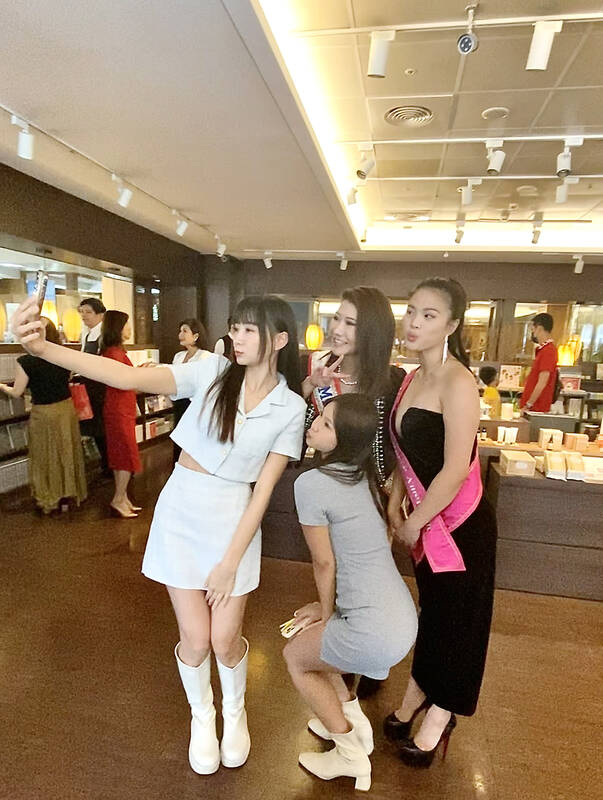Tiffany Chang (張芳瑜) is a force to be reckoned with. Crowned Miss Taiwanese American in 2022, she made history last year as the first Taiwanese winner of Miss Asia USA. She’s also a STEM student at Stanford and an aspiring philanthropist — the kind of impressive accolades that has earned her the moniker “light of Taiwan.”
At the end of March, Chang returned to Taipei, to “see the people that support me because ultimately that’s what made me win.”
She says her Taiwanese supporters shower her with praise: “you inspire us, and you make us feel proud of our Taiwanese heritage,” making her “feel proud and sort of validated that I’m doing the right thing.”

Photo: Hollie Younger
Following our preliminary interview, I spent a Saturday morning at a meet-and-greet for her; I needed to see for myself, who are these 47,000 Instagram followers? Who are her adoring Taiwanese fans? I anticipated bright-eyed young girls proclaiming their adulation for their role model, inspired by Tiffany’s grace, intelligence, kindness.
The reality? I am met by a troupe of gangling, bespectacled gamer boys. The sort that look like they rarely pry themselves away from their computer screen. As I reluctantly pose for selfies — my face filtered beyond all recognition — they claim to value Chang’s personality and intelligence. Hmmm.
In the bookstore of a Buddhist center, the event is hastily arranged, attended by some journalists but mostly Tiffany’s nearest and dearest: parents, grandma, her LA posture coach and Vera Yang, organizer of Miss Taiwanese American, not to be confused with the fashion designer.

Photo: Hollie Younger
Front and center is Chang’s mother, Lucy Huang: the ultimate helicopter parent. I noted her presence at our earlier interview, chiming in to name-drop President Tsai Ing-wen (蔡英文), and today she’s certainly no wallflower, parading for the newscasters and working the room like a true professional. During Chang’s speech, she barks cues like her personal teleprompter, before it’s her turn to grab the mic. Transcending your typical Tiger Mom, Chang’s performance is a work of art written and directed by her mother.
Treating the event as makeup artist audition, one attendee wields a well-used dirty sponge and packs thick stage powder onto my cheeks, and those of Chang and her mother. We share a moment of stunned silence, too mortified to protest. She’s using the same lipstick on all three of us, for God’s sake.
Next in the circus parade, an older lady in a bedazzling fuchsia dress and wide-brim sunhat, jostling herself, smiling for the camera, into any attempt at a candid shot of Tiffany. She’s here to promote her daughter’s pageant dream and spares no detail, from her prodigy’s conception to her zither-playing proficiency.
I spot two girls towards the back. Could they be my bright-eyed young fangirls? Nope, more Instagram it-girls, cheerleaders for Brothers baseball team. One identifies as a pageant queen herself. Now, I’m no expert, but her next endeavor is a pageant that surely nobody has heard of. They pout and peace-sign for a selfie with our VIP, and luckily for them Chang later shares it on Instagram. Nice work girls.
Now, the question on everyone’s lips: are there any actual fans at this thing? Yes, and some dedicated ones at that. According to staff, they arrived an hour early, not including Chang’s 30-minute delay. But Chang takes one look at our gaggle of socially inept, and balks.
Their meet-and-greet finally arrives, 10 minutes before Chang is rushed to her next engagement. They pose with sweaty palms pressed against hers, and she remains remarkably stoic. A cheerleader squeals and recoils from the selfie camera of one particularly terrifying young man. Finally, an obligatory photo with the staff who’ve never heard of her, and the paltry turnout disperses.
The event gives a sobering insight into Chang’s brand. Pageantry is accused of performing for the male gaze. Evidently, she’s eating right into their hands. Maybe young girls, the target audience, aren’t buying what she’s selling. And the actual audience? Lecherous men and unabashed social climbers. Is this really “the light of Taiwan?”

One of the most important gripes that Taiwanese have about the Democratic Progressive Party (DPP) is that it has failed to deliver concretely on higher wages, housing prices and other bread-and-butter issues. The parallel complaint is that the DPP cares only about glamor issues, such as removing markers of Chinese Nationalist Party (KMT) colonialism by renaming them, or what the KMT codes as “de-Sinification.” Once again, as a critical election looms, the DPP is presenting evidence for that charge. The KMT was quick to jump on the recent proposal of the Ministry of the Interior (MOI) to rename roads that symbolize

On the evening of June 1, Control Yuan Secretary-General Lee Chun-yi (李俊俋) apologized and resigned in disgrace. His crime was instructing his driver to use a Control Yuan vehicle to transport his dog to a pet grooming salon. The Control Yuan is the government branch that investigates, audits and impeaches government officials for, among other things, misuse of government funds, so his misuse of a government vehicle was highly inappropriate. If this story were told to anyone living in the golden era of swaggering gangsters, flashy nouveau riche businessmen, and corrupt “black gold” politics of the 1980s and 1990s, they would have laughed.

It was just before 6am on a sunny November morning and I could hardly contain my excitement as I arrived at the wharf where I would catch the boat to one of Penghu’s most difficult-to-access islands, a trip that had been on my list for nearly a decade. Little did I know, my dream would soon be crushed. Unsure about which boat was heading to Huayu (花嶼), I found someone who appeared to be a local and asked if this was the right place to wait. “Oh, the boat to Huayu’s been canceled today,” she told me. I couldn’t believe my ears. Surely,

When Lisa, 20, laces into her ultra-high heels for her shift at a strip club in Ukraine’s Kharkiv, she knows that aside from dancing, she will have to comfort traumatized soldiers. Since Russia’s 2022 invasion, exhausted troops are the main clientele of the Flash Dancers club in the center of the northeastern city, just 20 kilometers from Russian forces. For some customers, it provides an “escape” from the war, said Valerya Zavatska — a 25-year-old law graduate who runs the club with her mother, an ex-dancer. But many are not there just for the show. They “want to talk about what hurts,” she